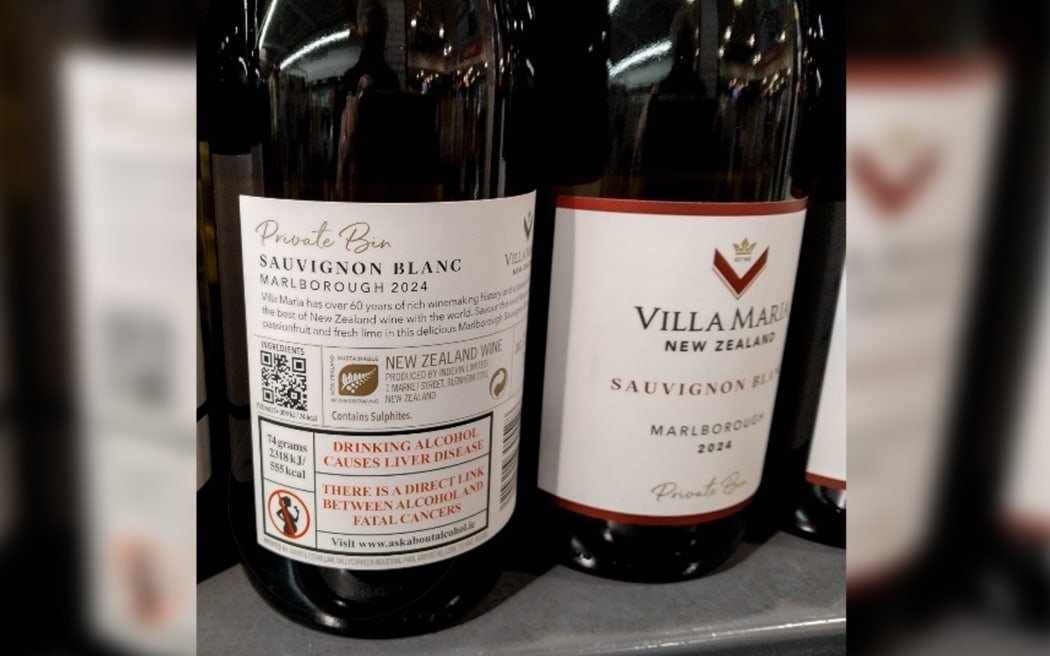
One of New Zealand’s most celebrated wine brands is putting cancer warning labels on wines exported to Ireland - nearly a year ahead of a law making the labels compulsory from May 2026.
Villa Maria wines sold in Ireland feature a label on the bottle warning drinkers ‘‘there is a direct link between alcohol and fatal cancers’’ and also that ‘‘drinking alcohol causes liver disease’’.
Alcohol harm reduction advocates say the labels should also be on alcohol sold in New Zealand rather than leaving drinkers in the dark about the cancer risk.
Simon Limmer, chief executive of Indevin which owns the Villa Maria brand, said cancer warnings were on all Villa Maria wines produced for the Irish market from the 2024 vintage onwards and had been appearing on shelves over the last six months.
The wine travelled long distances and could spend weeks in shipping containers and distribution before reaching retail shelves so acting early would avoid disruption for retail partners and consumers.
"Consumers will likely take note of the new labels in Ireland as it's a significant change across all alcoholic products but it's too soon to understand the ongoing impact on purchasing decisions."
Photos of Villa Maria wines featuring the warning labels were sent to advocacy groups in New Zealand by Alcohol Action Ireland, as it rallies support to stave off an alcohol industry lobbying effort to stall the labels.
Sheila Gilheany, chief executive of Alcohol Action Ireland, wrote to alcohol harm reduction groups in New Zealand warning of a "severe threat to Ireland's alcohol health information labelling regulations".
Gilheany told RNZ that Ireland's alcohol industry had opposed the cancer warning labels and was now using fears about trade tariffs to call for a delay.
Irish media now expect the government to defer the introduction of cancer warning labels until 2029.
Gilheany welcomed Villa Maria's acceptance of Ireland's labelling law and said winemakers from Australia and Spain had also been early adopters.
"They are assuming that the government is not going to turn its back on its own law. Why should it? But at the same time, we can see the pressure that the various sectors of the industry are placing on the government here in Ireland and seeking to have it postponed."
Ireland had about 1000 alcohol-related cancers every year and one in eight breast cancer cases were linked to alcohol but awareness of those risks was low, she said.
Governments had to "face down the lobbying" both locally and internationally, Gilheany said.
"We know that when Ireland goes ahead with this measure, particularly around the cancer warnings, it is likely that other nations will follow suit."
Global push for warning labels
Dozens of health groups recently wrote to British Prime Minister Sir Keir Starmer urging him to follow Ireland's lead.
The letter was coordinated by the World Cancer Research Fund (WCRF) which is calling for "clear, plain, distinct and mandatory" cancer warning labels rather than ambiguous language such as "drink responsibly".
In January this year, the US surgeon general said alcohol was a leading preventable cause of cancer and alcohol products should carry a warning label like cigarettes do.
Virginia Nicholls, executive director of the New Zealand Alcohol Beverages Council, said the industry did not support cancer warning labels.
"The level of health risk associated with alcohol is more complicated than a label can convey.
"Labelling does not take into account the difference between responsible and hazardous drinking. The best place to get information on any health concerns is from your doctor."
Labels may raise awareness but did not change behaviour and called for policies to "target the minority of people who are hazardous drinkers and not the large majority of Kiwis who are responsible drinkers".
Nicholls said cancer risk was low when drinking at "moderate levels" and claimed there were "benefits of moderate alcohol consumption" including reduced risk of heart attacks, ischaemic strokes and diabetes.
But in a 2023 statement the World Health Organisation said "when it comes to alcohol consumption, there is no safe amount that does not affect health".
"There are no studies that would demonstrate that the potential beneficial effects of light and moderate drinking on cardiovascular diseases and type 2 diabetes outweigh the cancer risk associated with these same levels of alcohol consumption for individual consumers."
The WHO says alcohol was classified as a Group 1 carcinogen by the International Agency for Research on Cancer decades ago.
"This is the highest risk group, which also includes asbestos, radiation and tobacco."
Lisa Te Morenga, co-chair of Health Coalition Aotearoa, said New Zealanders were being kept in the dark.
"Most New Zealanders don't really realise that alcohol is a carcinogen. So while the Irish are having their awareness raised, our consumers are missing out."
ACT's Nicole McKee, the Minister responsible for alcohol policy, is working on reform of the Sale and Supply of Alcohol Act.
She said her focus was on "regulatory relief" to make business easier for retailers and hospitality venues and also on reducing alcohol-related harm.
"I have not yet received any advice regarding cancer warning labels on alcohol products. Cabinet has yet to make any decisions regarding any reforms."













